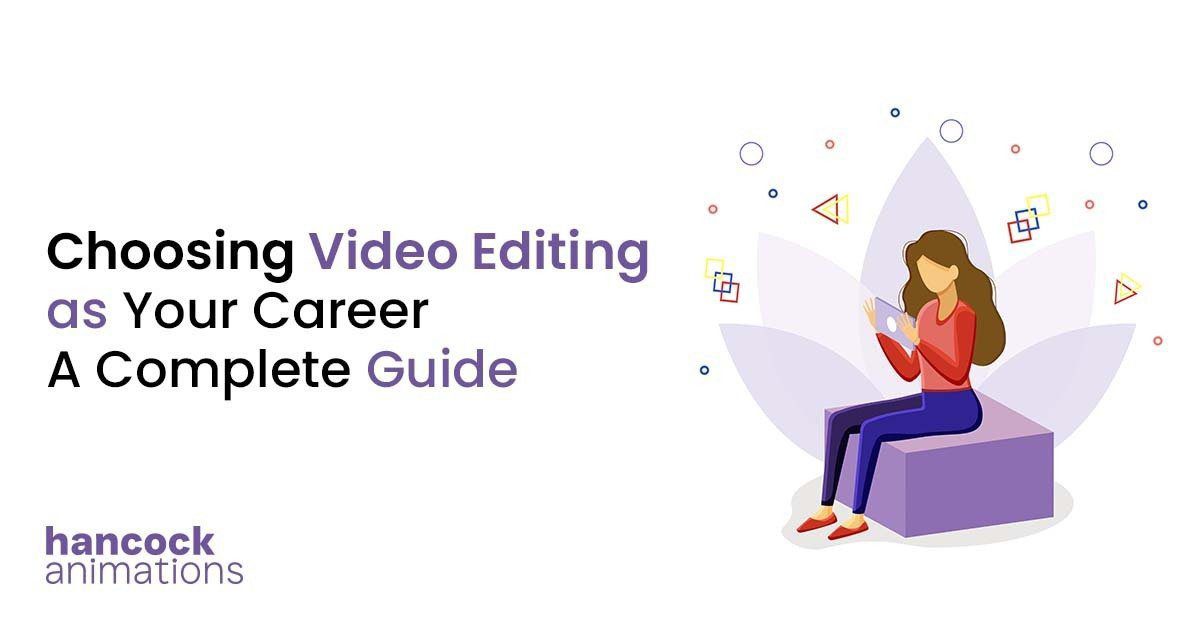Choosing Video Editing As Your Career - A Complete Guide

Video editing is a growing industry, and choosing a career in it is all you need in this growing era of digital marketing. It can open the door to an industry where creativity meets technology. When you think about the concept of media and entertainment, the use of videography pops up.
This has encouraged many individuals to implement the role of a video editor in their careers. If you are a person who is attracted to technology, has meticulous attention to detail, and has a passion for storytelling, then this field is just right for you.
The demand for skilled video editors has surged with the rise of digital platforms like YouTube, Netflix, and various social media channels, where video is a primary form of communication. This has created numerous opportunities in both traditional and new media sectors.
However, starting a career in video editing is not without its challenges. It requires a blend of artistic vision, technical proficiency, and the ability to work under tight deadlines.
Let’s start exploring the most wanted query, “Why Is Video Editing useful?” with a variety of options that can help you understand the essential skills, required credentials, job market insights, and expert advice on making a successful career in video editing.
Types Of Video Editing That You Can Build Your Career In
Starting a career in video editing offers many exciting opportunities in different areas of media and entertainment. The kind of video editing expertise you pick can depend on what you like to do, what you’re good at, and the needs of the specific area you want to work in.
Here are some main types of video editing that you could consider for your career:
1. Film Editing
Scope: Working on feature films, short films, and cinema projects.
Skills Required: Understanding of storytelling, pacing, and continuity editing. Proficiency in high-end editing software like Adobe Premiere Pro or Avid Media Composer is crucial.
Career Opportunities: Film editors can work in movie studios, independent film production, or freelance for various projects.
2. Television Editing
Scope: Involves editing for television shows, including sitcoms, dramas, reality TV, and news broadcasts.
Skills Required: Fast-paced editing skills to meet tight broadcast deadlines, with a knack for sequential and multi-camera editing.
Career Opportunities: Opportunities exist within television studios, news agencies, and production companies.
3. Documentary Editing
Scope: Editing factual content for educational and informational purposes.
Skills Required: Strong storytelling skills and ability to structure complex information into an engaging narrative.
Career Opportunities: Work with documentary production companies, non-profits, educational institutions, or as a freelancer.
4. Corporate Video Editing
Scope: Producing videos for companies, such as training videos, corporate presentations, and promotional videos.
Skills Required: Ability to convey corporate messages clearly and effectively, with a professional finish.
Career Opportunities: Many companies hire in-house video editors, or work can be done on a freelance basis for multiple corporate clients.
5. Commercial Editing
Scope: Editing short-form content like commercials and advertisements.
Skills Required: Creativity to make impactful, persuasive videos, often within a very short duration. Understanding of marketing strategies is a plus.
Career Opportunities: Advertising agencies, marketing firms, and freelance contracting for various brands.
6. Event Video Editing
Scope: Editing footage from events like weddings, conferences, and live performances.
Skills Required: Ability to capture the essence of live events and create emotionally engaging narratives.
Career Opportunities: Work with event production companies or establish a niche freelance service.
7. Music Video Editing
Scope: Creating visually appealing and rhythmically engaging videos for music tracks.
Skills Required: A good sense of rhythm and pace and an eye for experimental editing styles that match the music’s tone.
Career Opportunities: Collaboration with music production companies, artists, or freelance projects.
8. Online Content Editing
Scope: Editing content specifically for online platforms like YouTube, Vimeo, or social media.
Skills Required: Versatility in creating a range of content, from educational videos and influencer content to viral videos. Understanding platform-specific viewer behaviors and trends.
Career Opportunities: Work with content creators and media houses focusing on digital content or independently as a content creator.
Process of Video Editing
Video editing is the process of arranging, modifying, and enhancing video clips to create a new work, typically for film, television, or online content. It involves various tasks and skills that help create a final product’s narrative, pace, and visual appeal.
Here’s a breakdown of how video editing works:
1. Material Review and Selection
Raw Footage Review: Video editors begin by reviewing all the footage shot for a project. This might include different takes, angles, and scenes.
Clip Selection: From the raw footage, editors select the best clips based on performance, lighting, and continuity. They look for the moments that best tell the story or convey the intended message.
2. Assembly
Rough Cut: Editors start by creating a rough cut, which is the first version of putting together the selected clips. This version focuses on getting the sequence of scenes and basic timing right.
Fine Cut: After the rough cut, editors refine the video by tightening up the pacing, adjusting the cuts for smooth transitions, and ensuring the narrative flows logically and emotionally.
3. Post-Production Editing
Adding Effects: Video editors may add effects that enhance the film’s visual style or contribute to visual storytelling service. This can range from simple black-and-white filters to complex digital effects.
Color Correction: It is crucial to adjust the video’s colors to ensure consistency and visual appeal across all scenes. This process can enhance mood, atmosphere, and realism.
Sound Editing: Editors often work closely with sound engineers to integrate dialogue, background music, and sound effects. Good sound editing is essential for setting the tone and improving viewer engagement.
4. Final Edits and Output
Final Cut: After multiple reviews and adjustments, the final cut is produced. This version includes all corrections, effects, and sound integrations.
Rendering: The complete video is rendered, which involves compiling all elements into a single file. This process can be time-intensive, depending on the video’s complexity and resolution.
Output Formats: Finally, the video is exported into various formats, each optimized for different platforms, such as cinema, television, or online streaming.
Roles and Responsibilities of Video Editors
Video editing is both a technical skill and an art form, requiring both creative vision and precise attention to detail. A video editor’s job is very important in making a video because they take the basic footage and turn it into a clear and interesting story.
Creative Decision-Making
Video editors make significant creative decisions, influencing how the story is told visually. They choose the best angles and takes, the timing of cuts, and how scenes are arranged.
Technical Skills
Editors must be proficient with video editing software like Adobe Premiere, Final Cut Pro, or Avid. These tools are used to cut clips, add transitions, and create effects.
Collaborative Skills
They often work closely with directors, cinematographers, and other creative team members to ensure that the final product aligns with the director’s vision.
Time Management
Video editors need excellent time management skills, especially when working under tight deadlines to deliver the final product.
What Education Is Required To Be A Profesional Video Editor?
To become a professional video editor, there are various educational paths and experiences you might consider:
Formal Education
A popular route is obtaining a bachelor’s degree in film, media studies, communications, or a related field that focuses on film production and media arts. An associate’s degree in video production can also provide a solid technical foundation.
Technical Training and Certifications
Certifications in industry-standard video editing software such as Adobe Premiere Pro, Final Cut Pro, or Avid Media Composer can significantly enhance your credentials. Additionally, specialized courses in video editing and post-production techniques from online platforms and institutions are valuable for gaining specific skills.
Practical Experience
Gaining hands-on experience through internships at production companies or digital media firms is highly valued. Working on freelance projects can also help you build a strong portfolio and practical editing skills.
Self-Learning
Utilizing online tutorials and resources can be an effective way to learn and refine editing techniques on your own. Regular practice by creating personal video projects is essential for honing your skills.
Workshops and Seminars
Attending industry workshops and seminars can provide insights into the latest standards and technologies used in video editing, along with opportunities for networking.
These educational and experiential pathways combine to equip prospective video editors with the necessary skills and knowledge to succeed in this creative and dynamic field.
How To Fully Prepare For A Video Editing Job Interview
Preparing for a video editing job interview requires a mix of showcasing your technical skills, understanding the company’s style and needs, and presenting yourself as a creative and reliable candidate.
Here are some steps to help you fully prepare:
1. Research the Company
Understand Their Content: Watch as many videos as the company has produced. Pay attention to the style, pacing, and types of content they favor.
Know the Industry: Be aware of current trends in video editing within the industry you’re applying to—whether it’s film, television, online media, or corporate videos.
2. Review the Job Description
Skill Requirements: Make sure you understand the technical skills required, such as familiarity with specific editing software like Adobe Premiere Pro, Final Cut Pro, or Avid.
Responsibilities: Understand the role’s responsibilities and think about how your past experiences align with them.
3. Prepare Your Portfolio
Show Relevant Work: Include pieces in your portfolio that reflect the style and quality the employer produces or is looking to produce.
Tell a Story: Be ready to discuss the process of your projects, the challenges you faced, and how you resolved them. This will show your problem-solving skills and creativity.
4. Brush Up on Skills
Software Proficiency: Make sure you are up-to-date with the latest versions of software you’ll be expected to use.
Technical Skills: Revisit any tools or techniques you might be rusty on, especially if they are mentioned in the job description.
5. Practice Common Interview Questions
Technical Questions: Be prepared to answer technical questions about your workflow, choice of tools, and techniques.
Behavioral Questions: Be ready for questions about handling deadlines, working under pressure, or collaborating with others.
Scenario-Based Questions: You might be given a hypothetical editing scenario to see how you would handle it.
6. Prepare Questions to Ask
Company Culture: Questions about company culture, typical project timelines, and team structure can provide insight into your potential work environment.
Future Projects: Asking about upcoming projects shows your interest in contributing and can help you understand what kind of work you might be doing.
7. Technical Test Preparation
Expect a Test: Some interviews may include a practical test in which you’ll need to demonstrate your editing skills. Make sure you are familiar enough with the software to edit confidently under time constraints.
8. Make A Lasting Impression
Dress for the Role: While video editors often enjoy a more casual work environment, it’s important to appear neat and professional.
Be Punctual: Plan your route to the interview location ahead of time, aiming to arrive a little early to avoid any last-minute stress.
By following these steps, you’ll present yourself as a knowledgeable and prepared candidate, ready to take on the challenges of a video editing position.
Is Opting Video Editing As Your Career Worthy In 2024?
Deciding to make video editing your career in 2024 means thinking about several important factors:
Growing Demand
More people are watching videos on platforms like Netflix, YouTube, and social media, which means there’s a bigger need for video editors. This is good news if you’re looking into this career because it suggests that jobs in this field are likely to increase.
New Technology
New technologies like virtual reality and artificial intelligence always change video editing. If you enjoy learning new tools and techniques, this can make your work exciting and can also help you stand out in the job market.
Variety of Jobs
Video editing skills are useful in many different areas, such as movies, TV, advertising, and online content creation. This variety means you can choose from many different types of projects, which can keep your job interesting.
Freelance Opportunities
There are many chances to work as a freelance video editor. This can be great if you like setting your own schedule and choosing the projects that interest you.
Creativity
Video editing is a creative editing service that allows you to tell stories using video. This career can be very fulfilling if you love being creative and making stories come alive.
Money Considerations
While video editing can eventually lead to a good income, starting salaries might be low, and the field is competitive. Success often depends on your skills, experience, and how well you connect with others in the industry.
Continuous Learning
Being a video editor requires you to keep learning new skills and keeping up with changes in technology and editing techniques. You’ll need to be okay with continuously improving and updating your skills.
How Much Can You Make As A Video Editor?
The salary of a video editor can vary widely depending on several factors, including experience, location, the industry they work in, and the type of content they are editing. Here’s an overview of what video editors might expect to earn:
1. Entry-Level Editors
New video editors just starting their careers typically earn lower salaries. In the United States, entry-level video editors might earn anywhere from $30,000 to $40,000 per year, depending on their location and the specific industry.
2. Mid-Level Editors
With a few years of experience, video editors can expect to see their salaries grow. Mid-level editors often earn between $45,000 and $65,000 annually. This range can be higher in industries like film and television or in regions with a high demand for video production.
3. Experienced Editors
Video editors with substantial experience and a strong portfolio can earn significantly more. Salaries for these editors can range from $70,000 to well over $100,000 annually, especially if they work in major media markets like New York City or Los Angeles or on high-profile projects.
4. Freelance Editors
Freelance video editors have the potential to earn more based on the volume of work they can secure and the rates they charge. Freelance rates can vary widely, typically ranging from $25 to $100 per hour, based on the complexity of the project and the editor’s expertise.
Wrap Up
Choosing video editing as a career in 2024 is a great idea because it combines creativity with technology. As more people watch videos online, the need for skilled video editors is increasing in areas like movies, TV shows, and internet content.
Whether you learn video editing by studying, teaching yourself, or working, there are many chances to succeed. By keeping up with new technology and improving your skills, you can enjoy your work and also make good money.
FAQs
Logo animation is the process of bringing a static logo to life through motion graphics and visual effects, creating an engaging and lively representation of a brand’s identity.
A logo animation adds a professional and modern touch to your brand, making it more memorable and helping it stand out in a competitive market. It also adds a layer of sophistication and creativity, which can leave a lasting impact on your audience.
Yes, our team at Hancock Animations works closely with clients to understand their preferences and brand identity, ensuring that the logo animation aligns with their specific requirements, including customizing styles, colors, and effects.
Logo animations can significantly enhance your marketing efforts by making your brand more visually appealing and engaging. They can be used in various digital marketing campaigns, social media platforms, presentations, and promotional videos, effectively grabbing the audience’s attention and memorably conveying your brand message.
The cost of a 2 to 10-second logo animation varies depending on factors such as the animation style, duration, and whether a static logo is already available. Prices typically range from $200 to $2000. Additional expenses may apply for special effects, 3D rendering, and sound effects, which can further elevate the overall cost.
Logo animation services on average take 3-4 business days to deliver a 2-4 second animated logo. If you already have a logo, it takes less time. Designing an animated logo from scratch naturally takes longer.

